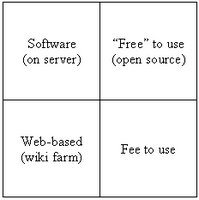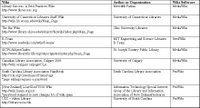Several libraries use Flickr, and the idea of using
Flickr to manage and display a digital collection is not new. A Google search of:
flickr "digital collection" returns its first result as a blog post from October 2005 with the title
Flickr as a digital collection hosting example, where the author suggests a "...practical example of what libraries could do with Flickr from a small digital collection perspective." We know it is possible to use Flickr to host a digital collection, but
when should we use Flickr? How would we recognize a potential digital collection as being ideally suited for hosting on Flickr? What criteria should we use to evaluate Flickr as a host?
In an attempt to answer the question, “When should libraries use Flickr to host digital collections?” a brief search of the professional literature was conducted. A search of the library literature in three major databases does not result in many articles on Flickr, which is in contrast to the hundreds, if not thousands, of blog postings about it.
SEARCH STRATEGYHere are the results of a quick search for articles on Flickr in three databases using a simple keyword search: flickr OR flick*r
1.
Library Literature & Information Science with Full Text-flickr (2 results)
-flick*r (5 results)
The subject heading suggested by the thesaurus when we search for “Flickr” was Internet/Terminology.
2.
Library and Information Science Abstracts (LISA)-flickr (3 results)
-flick*r (9 results)
LISA offered a specific subject heading for the organization, or corporate entity: Flickr.com
3.
Library, Information Science & Technology Abstracts (LISTA)· flic*r (41 results)
· flickr (13 results)
LISTA applied several subject headings, with no discernable conformity, to articles mentioning Flickr. Here is a sample: DIGITAL images; PHOTOGRAPHY -- Computer network resources; PHOTOGRAPHY -- Digital techniques; PHOTOGRAPHY -- Social aspects; SOCIAL networks; FILE sharing (Computers); IMAGES, Photographic, etc. Also, FLICKR Online (Company) was a subject heading.
ARTICLESFrom the search strategy describe above, a few articles on Flickr were retrieved. Aside from a review of a book on Flickr in Library Journal, what did we find relevant?
1. Harris, C. “Flickr and BubbleShare: Photo-sharing sites.”
School Library Journal 52, no. 7 (July 2006): 19.
Briefly explores Flickr as a digital collection host for libraries: “This is your chance to jump onboard at your library. If the technical benefits of picture hosting and sharing aren't enough to excite you, imagine creating a rotating display of student pictures on your library's Web site.” A short article, but one of the only articles to focus on Flickr. Many articles discuss “social software,” or Web 2.0, so it stands out when an article concentrates on one tool. As we move from awareness of these tools, and some of them become more established, then perhaps we shall see specific articles?
2. Sauers, Michael. “Internet connection. Fun with Flickr.”
Action for Libraries 32, no. 3 (Mar 2006).
Tools used by searchers using Flickr are listed. I was unable to read the full-text of this article, so I only read the abstract.
CONSIDERATIONSA much broader literature search is needed before any conclusions may be drawn, and by “broader,” it would seem that any research on Flickr as a potential host of digital collections sponsored by libraries has to be conducted in blogs and listservs for now.
From the perspective of evaluating Flickr as a sustainable host for digital collections put up by libraries, here are some points to keep in mind from Flickr’s FAQs:
--a
free version is “guaranteed” to always exist
--using the free version, one may only upload 20 MB per month
--inactive free accounts may be deleted after
90 days of inactivity--free accounts only display up to 200 photos, or the 200 most recent
--photos will
not be deleted unless you delete them
--each photo must be
less than 5 MB (on the free account)
--TIFFs can be uploaded, which is most likely the format being scanned for master copies by institutions maintaining a digital collection, but they are converted and stored as JPEGs (the most likely format used to display images in a digital collection)
--Flickr offers many
copyright options, and one can even prevent people from downloading the images.
Based on the information above, it would seem that a digital collection could be hosted, managed, and maintained on Flickr. At the same time, there are limitations that should be planned for when considering Flickr as a host.
The success of using Flickr to host a digital collection, like any other hosting solution, depends on what it is being used for by librarians (e.g. photographs of your library, community events, etc.). Flickr offers libraries with limited resources and staffing an opportunity to provide access to a small digital collection. Although “digital collection” has not been defined here, our perception is that libraries have used Flickr as an online photo album, but what about using Flickr to host a digital collection in place of a more traditional solution, such as a server and content management system (e.g. CONTENTdm,
Streetprint.org, MySQL-backed web site, etc.)?
Flickr makes it easy to upload images, and it enhances them with commenting, tagging, and searching features.



